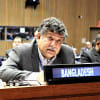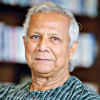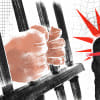Limitation of UN mechanisms

Since Its establishment in 1945, the United Nations (UN) has been playing the role of a pioneer in institutionalising human rights through setting norms and standards as well as in the development of monitoring mechanisms to ensure the implementation of such. However, there remains a huge challenge in the implementation of human rights through UN mechanisms.
The Universal Declaration of Human Rights (UDHR) 1948 provides the foundation for articulation of various human rights. Since then, the UN has adopted numerous human rights instruments in form of declarations, principles, guidelines, conventions and covenants. By now, it has adopted 9 core subject-specific international treaties elaborating the rights outlined in the UDHR.
The UN Human Rights Council is the principal UN body entrusted with the tasks for the promotion and protection of human rights, which operates through different working mechanisms such as, Universal Periodic Review (UPR), Complaints Procedure Mechanism, and Advisory Committee, etc. Of these various mechanisms, UPR is the most vital monitoring mechanism by which human rights record of each member state is reviewed in every 4 year cycle. Besides, there are independent expert mechanisms to monitor human rights situations in specific countries or territories. The core human rights treaties also have their own monitoring system known as treaty bodies system to monitor the implementation of the treaty obligations by the state parties.
Despite its commendable contribution in setting comprehensive legal human rights framework, in operational level, the UN has not been able to play effective role in implementing human rights because of various reasons. The first and foremost challenge lies with the inherent nature of international law and basic attributes of human rights denoting relationship between individual citizen and nation state where primary responsibility of the safeguard of human rights lies with the state. The UN system does not have direct enforceability at the state level to ensure the practice of such UN mechanisms. By ratifying the relevant human rights treaties, nation states undertake direct obligations to ensure human rights of their citizens without any discrimination.
UN mechanisms follow a cooperative dialogic approach and the outcomes of all these processes are recommendatory in nature, implementation of which depends on the sole discretion of the individual state to give enforceability to international human rights laws and thus to protect human rights of its citizens.
In the absence of direct enforceability of international human rights laws at the state level, political commitments of the state parties play dominant role in implementation of human rights provisions. However, for the sake of power interest, state parties often fail to show the adequate political commitment to uphold the principles of human rights. Being a political forum of the states, the UN mechanism often takes politically influenced double-standards measurers in dealing with human rights. Due to a power-play among the member states, the UN cannot take any strong stance against politically and economically powerful, despite the clear cases of gross violations of human rights. Operations of Guantanamo detention centre, human rights situation in Afghanistan and Gaza are some awful examples of this failure. The prevalence of bloc politics also dominates the functioning of UN human rights system causing for a more state-orientated approach instead of upholding human rights principles and standards.
Another challenge lies with the absence of effective mainstreaming of human rights across the UN system which hinders the objective functioning of the human rights system, for instance, notwithstanding the firm resolution of the Human Rights Council on a situation of gross human rights violations, the political stand of the UN Security Council could create blockade to the effect of the resolution of the Human Rights Council.
To conclude, despite their inherent limitations it cannot be denied that the UN mechanisms indeed provide a legal tool for the implementation of human rights. Importantly, the UN mechanism still serves as an important instrument for the creation of political pressure on the recalcitrant governments. Having said this, there is no alternative to strengthening national level human rights enforcement mechanisms following the international standards set by the UN.
The writer is Human Rights advocate.

 For all latest news, follow The Daily Star's Google News channel.
For all latest news, follow The Daily Star's Google News channel. 








Comments